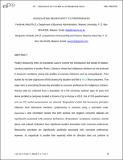| dc.description.abstract | Poultry biosecurity refers to procedures used to prevent the introduction and spread of diseasecarrying organisms in poultry flocks. Literature shows that indigenous chickens are not produced in biosecure conditions raising risk profiles of zoonotic infections such as Campylobacter. Prior studies do not take cognizance of this biosecurity situation and fail to focus final consumers. This paper aims at associating biosecurity principles to consumer preferences for indigenous chickens. Primary data are collected from a population of 5,738 university students aged 18 years and above enrolled in campuses located in Kisumu City in Kenya in 2013. Out of 378 questionnaires sent out 281 useful questionnaires are returned. Respondent’s belief that biosecurity principles influence their behavioral intentions (preferences) is assessed using a summated scale. Spearman’s rank correlation reveals that both positive and negative consumer attitudes are significantly associated with consumer preferences. Respondents’ occupation, residence, marital status, and cultural inclination have significant positive association with consumer preferences. Biosecurity principles are significantly positively associated with consumer preferences, however, its magnitude is smaller than expected while its direction does not conform to literature. It is concluded that biosecurity principles are positively associated to consumer preferences. The study has managerial implications in agricultural marketing. | en_US |

